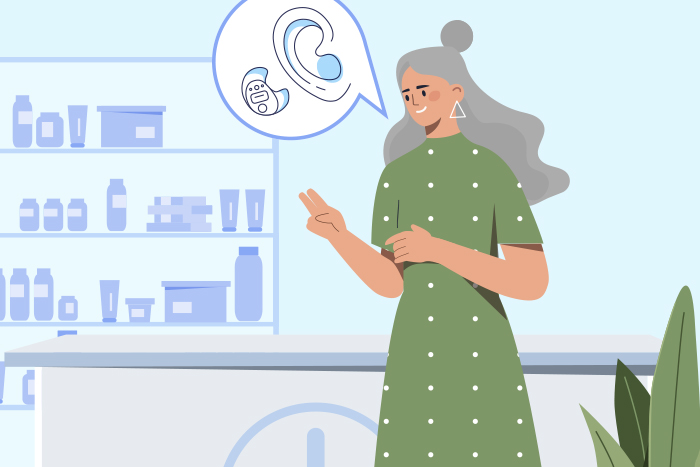Understanding Over-the-Counter (OTC) Hearing Aids
If you’ve been struggling to hear conversations or turning the TV volume up higher than usual, you might be wondering about hearing aids. The good news is that you no longer need a prescription to get help. Over-the-counter (OTC) hearing aids are a new option that makes hearing assistance more accessible and affordable for many people. These devices can be purchased directly from stores or online, making it easier than ever to improve your hearing without a doctor’s visit.
OTC hearing aids are designed for adults with mild to moderate hearing loss. You may have mild hearing loss if you can hear some speech but struggle to hear soft sounds. If you have moderate hearing loss, you may hear almost no speech when someone is talking at a normal level. OTC hearing aids can help amplify sounds, making speech clearer and improving your overall listening experience. But how do they work, and are they the right choice for you? Let’s explore what you need to know.
What are OTC hearing aids?
OTC hearing aids are a type of hearing device that you can buy without a prescription. The U.S. Food and Drug Administration (FDA) approved OTC hearing aids to give consumers more options for managing hearing loss without the need for a medical evaluation or fitting by an audiologist. An audiologist is a healthcare professional who specializes in diagnosing and treating hearing and balance disorders.
How do they work?
Like traditional hearing aids, OTC models amplify sound to help you hear more clearly. Most devices have microphones to pick up sound, processors to adjust the sound levels, and speakers that send the sound into your ear. Many OTC hearing aids also come with customizable settings, allowing you to adjust volume and sound clarity based on your needs.
Differences Between OTC and Prescription Hearing Aids
OTC hearing aids are designed for mild to moderate hearing loss and are available without a prescription. OTC devices are often more affordable and easier to purchase, while prescription hearing aids require a professional fitting and can be more expensive.
Prescription hearing aids are customized by an audiologist and can help with all levels of hearing loss, including severe cases.
Who can benefit from OTC hearing aids?
OTC hearing aids aren’t for everyone, but they can be a great solution for many people. A hearing test done by an audiologist can determine what your degree of hearing loss is and whether an over-the-counter hearing aid might work for you.
You might be a good candidate if:
You have mild to moderate hearing loss, meaning you can still hear but struggle in certain situations, like in noisy environments or group conversations.
You often ask people to repeat themselves or find it difficult to follow conversations.
You prefer an affordable and accessible solution without the need for a prescription or doctor’s visit.
You are comfortable with self-fitting and adjusting your hearing device using instructions or a smartphone app.
However, if you have severe hearing loss, sudden hearing changes, or ear pain, it’s important to see a doctor or audiologist before trying OTC hearing aids.
How to Choose the Best OTC Hearing Aid for Your Needs
With many OTC hearing aids on the market, it’s important to find the right one for you.* Here are some key factors to consider:
1. Sound Quality and Features
Look for hearing aids that offer:
Noise reduction to help in crowded spaces.
Adjustable volume settings for different environments.
Feedback cancellation to reduce whistling sounds.
2. Comfort and Fit
OTC hearing aids come in different styles, including in-ear and behind-the-ear models. Choose one that feels comfortable and stays securely in place.
3. Ease of Use
Some OTC hearing aids come with smartphone apps that allow you to control settings easily. If you prefer a simple device, look for one with straightforward controls.
4. Battery Life and Charging
Check whether the hearing aid uses disposable batteries or a rechargeable option. Rechargeable models can be more convenient and cost-effective over time.
5. Return Policy and Warranty
Since hearing aids are a significant investment, look for brands that offer trial periods, return options, and warranties in case you need adjustments or repairs.
Are OTC hearing aids right for you?
If you suspect you have hearing loss but aren’t ready for prescription hearing aids, OTC devices may be a great first step. They provide an affordable and convenient way to improve your hearing without a doctor’s visit. However, if you try an OTC hearing aid and still struggle to hear clearly, it may be time to see an audiologist for further evaluation.
Take the Next Step for Better Hearing
Hearing loss doesn’t have to limit your quality of life. With OTC hearing aids, you can take control of your hearing health and stay engaged in conversations, social events, and daily activities. If you think an OTC hearing aid might be right for you, start by researching trusted brands, comparing features, and checking reviews to find the best option for your needs.
Sources:
Mayo Clinic: Hearing aids: How to choose the right one
U.S. Food and Drug Administration: OTC Hearing Aids: What You Should Know
Johns Hopkins Medicine: Over-the-Counter Hearing Aids: Frequently Asked Questions
*Disclaimer: Healthcare Select may earn a commission if you purchase a product or service through links to our partners. This comes at no extra cost to you.

